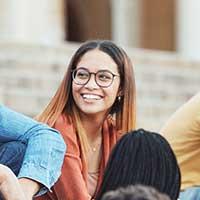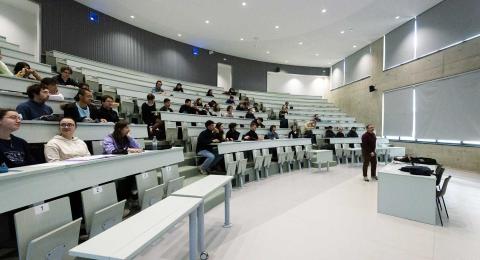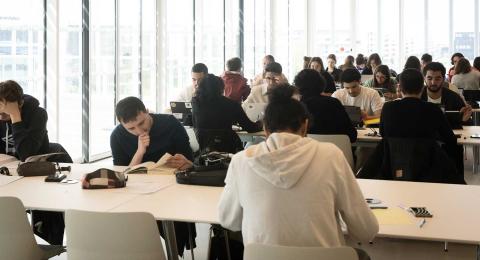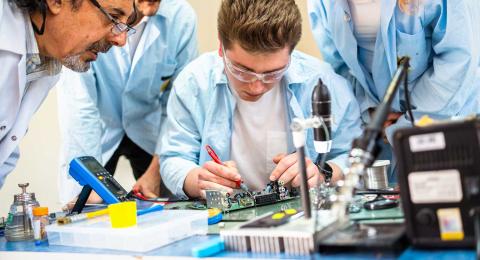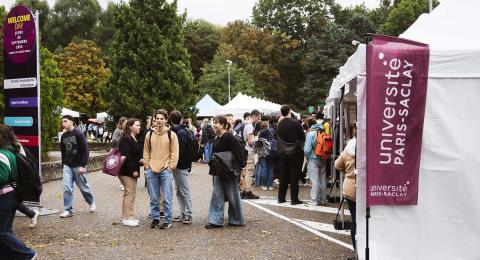Les conséquences des maladies neurologiques et le handicap qu'elles génèrent est un enjeu majeur de santé publique dans les années à venir. En attendant des solutions curatives pour certaines pathologies, il est indispensable d'améliorer la prise en charge des différentes déficiences d'origine neurologique. La promotion de l'activité de recherche allant de la recherche translationnelle à la recherche clinique dans ce domaine est primordiale.
Le Master 2 handicap neurologique est divisé en 2 semestres. Le premier est dédié à un enseignement théorique sur la pathologie neurologique et les principales déficiences générant un handicap d'origine neurologique (motrices, respiratoires, cognitives, vésico-sphinctériennes, la douleur.... et les complications associées au handicap). La prise en charge et la recherche clinique et translationnelle dans ces différentes déficiences sont traitées.
Le second est dédié à un stage en laboratoire de recherche académique d'une durée de 5 à 6 mois concrétisé par un mémoire de recherche et une soutenance orale.
Information
Skills
Acquérir et mobiliser des savoirs pluridisciplinaires complexes et hautement spécialisés.
Objectives
L'objectif du Master recherche est de former des médecins spécialisés en Médecine Physique et Réadaptation, mais aussi d'autres spécialités médicales ou biologiques, des para-médicaux (kinésithérapeutes, ergothérapeutes, psychologues, orthophonistes, psychomotriciens, podologues) et des étudiants en STAPS, en biologie ou ingénieurs à la recherche dans le domaine du handicap neurologique. L'approche utilisée dans ce master se veut résolument interdisciplinaire, faisant appel à des enseignants de disciplines différentes, tous expérimentés dans leur domaine dont la caractéristique est de constituer une équipe pédagogique de qualité, diversifiée et complémentaire. Il est présenté au cours de cette formation l'ensemble les domaines de recherche appliquée au handicap neurologique allant de la recherche clinique, à la recherche translationnelle sans oublier la recherche en physiologie et physiopathologie. À l'issue de cette formation, 3 grandes compétences professionnelles seront acquises :
- Une compétence clinique via l'enseignement de la prise en charge standard des différentes pathologies rencontrées dans le domaine du handicap neurologique.
- Une compétence de recherche via l'enseignement théorique et pratique (stages en laboratoire de recherche) dispensé au cours du Master.
- Une compétence managériale : organisation de projets de recherche dans le domaine du handicap neurologique.
Career Opportunities
Career prospects
Après un master : Chargé(e) d’études
Après Master + Doctorat : chercheur ou enseignant-chercheur
Après un Master ou Master + Doctorat : ingénieur (recherche-développement, contrôle, production…) dans les domaines santé, pharmacie, agroalimentaire, biotechnologies, instruments et réactifs, cosmétique, dépollution et environnement
chargé de projet scientifique / santé publique
Coordinateur.rices d’étude ou chargé.es de projets dans la recherche clinique
ingénieur de projet en santé
Ingénieur de recherche ou d'études
métiers de la recherche
responsable de suivi et d’évaluation de projet
Secteurs d'activité : recherche fondamentale ou appliquée en Biologie, Santé ou Écologie dans le monde académique ou dans le secteur privé
Further Study Opportunities
Doctorat
Formation d'attaché.e ou assistant.e de Recherche Clinique
Ingénierie études, recherche et développement
Les diplômés disposent ainsi des compétences attendues dans des secteurs en évolution rapide comme la tech, la finance, la santé ou l’énergie.
Les étudiants de cette mention peuvent se tourner vers la recherche à l’issue du M2
Les étudiants titulaires d’un M2 ont la possibilité de poursuivre dans la recherche en doctorat
Thèse de doctorat
Fees and scholarships
The amounts may vary depending on the programme and your personal circumstances.
Admission Route
Capacity
Available Places
Target Audience and Entry Requirements
Etre titulaire d'un M1 ou d'un équivalent de M1 via la validation des acquis de l'expérience pour l'accès en M2. Il peut s'agir d'un M1 de biologie, de STAPS, de psychologie, d'une formation paramédicale, d'un diplôme d'ingénieur permettant la validation d'un M1 ou une formation médicale.
Application Period(s)
From 30/01/2026 to 30/06/2026
Supporting documents
Compulsory supporting documents
Motivation letter.
Letter of recommendation or internship evaluation.
All transcripts of the years / semesters validated since the high school diploma at the date of application.
Curriculum Vitae.
Additional supporting documents
Certificate of French (compulsory for non-French speakers).
VAP file (obligatory for all persons requesting a valuation of the assets to enter the diploma).
Document indicating the list of local M2 choices available here : https://urlz.fr/i3Lo.
Supporting documents :
- Residence permit stating the country of residence of the first country
- Or receipt of request stating the country of first asylum
- Or document from the UNHCR granting refugee status
- Or receipt of refugee status request delivered in France
- Or residence permit stating the refugee status delivered in France
- Or document stating subsidiary protection in France or abroad
- Or document stating temporary protection in France or abroad.






